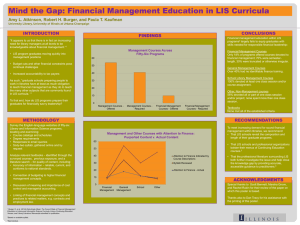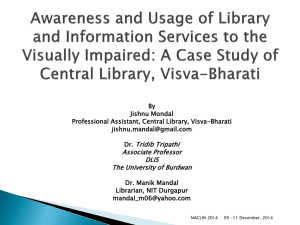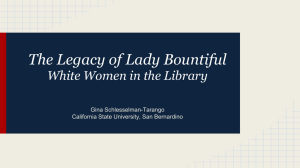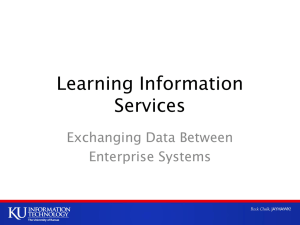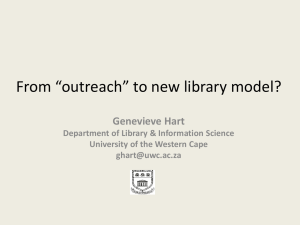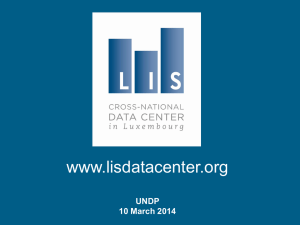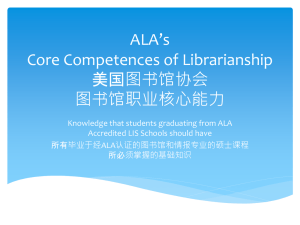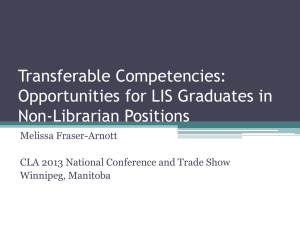Revamping Library and Information Science Education in India
advertisement
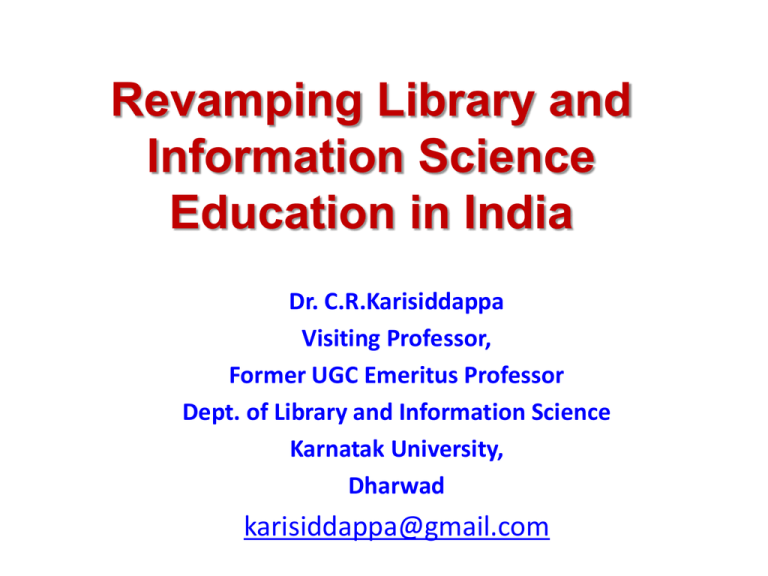
Revamping Library and Information Science Education in India Dr. C.R.Karisiddappa Visiting Professor, Former UGC Emeritus Professor Dept. of Library and Information Science Karnatak University, Dharwad karisiddappa@gmail.com Outline • Introduction : Looking back & moving forward • Towards Global thinking of LIS Education in India • Concept of Library : A paradigm shift • Revamping LIS Education • Dimensional Changes & Need for Revamping • Changing scenario-Emerging new concepts • Conclusion 4/13/2015 NACLIN 2012 2 100 Years - Looking Back & Moving Forward!! • • • • • Baroda School, 1911 and Service to Society Remembering Maharaja Sayyaji Rao Gaikwad -III Entry of Ranganathan in 1930s Establishment of UGC - impetus to Librarianship Library Legislation – Network of public libraries ( 18 states enacted the Library Acts in India) • Industrial Growth – Need for Documentation and Information Services • Need for Manpower for different kinds of libraries 4/13/2015 NACLIN 2012 3 Looking Back & Moving Forward!!... • Ranganthan estimated need for more than 100,000 professionals in India in 1964 itself • UGC Reports (1965 w.r.t. LIS Education) • Steady growth of LIS Education, Research & Training • Present Scenario – 150 Universities, Distance Education Programmes, Specialized Training Institutions & programmes • Levels of Education – From Certificate to Doctoral Programmes • Change in nomenclature – B.Lib.Sc. To B.L.I.Sc; to Two Years M.L.I.Sc on par with other Post- Graduate Studies 4/13/2015 NACLIN 2012 4 Towards Global Thinking of LIS Education • • • • • • • World wide changes & changes in work place Change of pattern of curriculum Evaluation process & quality assessment & need National Knowledge Commission (NKC) Users assimilation of ICT Library Networks & E-content growth UGC e-Pathashala towards content creation & new learning environment (e-Learning) • Globalization & Internationalization of LIS Education in India (w.r.t. inflow of foreign students) 4/13/2015 NACLIN 2012 5 Concept of Library : A Paradigm shift • Core concept of Library emanated from the idea of “Recorded Knowledge” • Paradigm shift witnessed due to mode of changes in Recorded Knowledge & Communication process & impact on profession including education process • Changes in Modes of Recording & Revolution in Communication of Recorded Knowledge – Speech: Possible to make propositions – Writing/Recording : Possible to preserve them (speaker independent) 4/13/2015 NACLIN 2012 6 Concept of Library : A Paradigm shift (Contd…) • • • • – Printing (Revolution in Mode of Recording): Possible to preserve them writer independent – Digital (Invisible/Virtual Mode of Recording): Possible to access source of information without physical ownership Predominance of print replaced by multiplicity of communication media Ease of research, writing, editing &publication Paved way for increasing quantum of information & information overload to users Increasing number of information providers 4/13/2015 NACLIN 2012 7 Concept of Library : A Paradigm shift (Contd…) • Earlier – All users mainly use to look towards library for knowledge & information • Now – Ample number of information sources & providers for getting knowledge & information • Shift in practice and learning 4/13/2015 NACLIN 2012 8 Revamping of LIS Education in India Points to Ponder • Status of Library Systems – Library Centered Education – Declining strength of LIS manpower in Libraries (Academic) – LIS Departments and Libraries – lack of togetherness – Lack of Library Culture 4/13/2015 NACLIN 2012 9 Contd.. – Status of Public Libraries ,fading status of Special Libraries – Go back to school to learn “Library organization, management and administration” is need of hour – Needs of users changing – General to Specific – Document to Information – Users turning more ICT Savvy 4/13/2015 NACLIN 2012 10 Contd.. • Choice of Curriculum Pattern – Traditional, Integrated, CBCS • Need of Learning to Learn, Unlearn & Relearn by Teachers • Professional Development Programmes - for LIS • Professionals, Teachers – Multi-organizational levels & courses • Dawn of Accreditation & Assessment process • Distance Education – Pros & Cons 4/13/2015 NACLIN 2012 11 Contd.. • LIS Research – Quality Vs Quantity – Need for Evaluation, Selection & Assessment pattern of Research – Content of Research papers (Plagiarism) – Assessment & census of number of conferences & seminars organized in India (Almost One per day – an estimated 350 in 2011) 4/13/2015 NACLIN 2012 12 Contd.. – Offer of Doctoral Programmes – lack of vision – Training for conducting research for Researchers and Supervisors (Guides) – UGC Guideline – ISBN Tag to Conference Volumes is not Quality Tag to assess research quality of paper 4/13/2015 NACLIN 2012 13 Dimensional Changes and Need for Revamping • Cooperation & Collaboration – Networking of LIS Schools • Admissions of Students & Practices • Pattern of Affiliation of LIS Departments • Infrastructure • Recruitment pattern of LIS Teachers • Training of LIS Teachers • Institute a “Council for Library and Information Science” to complement Education, Research & Training 4/13/2015 NACLIN 2012 14 Changing Scenario –Emerging Neo-concepts • Change of Designation – From Librarian to Cybrarian – Desirable Vs Undesirable • Accreditation & Assessment of Courses – Modus Operandi • Placement facilities – Professional schools – Engineering & Management have mandate to place products – should LIS schools take this mandate? 4/13/2015 NACLIN 2012 15 Contd.. • Research Funding & projects – Social Involvement & socially relevant projects & more funding for such projects across domains • National Mission on Libraries – Terms of reference, recommendations and implementation • Quality of Inputs – Change in pattern of admissions & evaluation 4/13/2015 NACLIN 2012 16 Conclusion • Survival of fittest - this law applies to LIS education programme more today than ever – Well managed departments flourish – Managed departments survive – Ill Managed departments collapse • Accreditation – NAAC can initiate process • The quantum stress of ICT in LIS Courses – duality of interests & neither would work with focus on some areas 4/13/2015 NACLIN 2012 17 Conclusion… • Ever widening user community interests & perceptions – from non automated to automated to web environment & implications on education & training • More & more issues of contemplation on wider scope of LIS to LIST & Knowledge Society 4/13/2015 NACLIN 2012 18 Conclusion… • To conclude we the teachers, researchers & practitioners have great responsibility to provide useful education to students as well as professionals • We have to prepare capable LIS professionals suiting to Knowledge Society • Let us remember the glorious words of Robert Frost “The Woods are lovely, dark and deep, but I have promises to keep, and miles to go before I sleep” 4/13/2015 NACLIN 2012 19 Thank You 4/13/2015 NACLIN 2012 20
